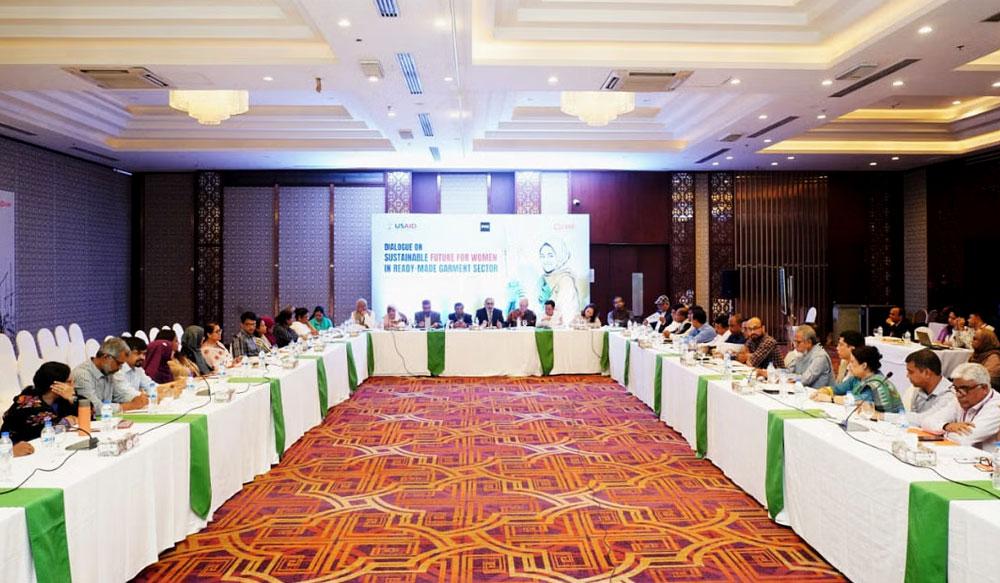Originally posted in New Age on 28 October 2024
Career prospects of female RMG workers facing hurdles: experts

Experts and labour rights campaigners on Monday said that the long-term career prospects for female workers in Bangladesh’s garment industry had been getting hindered by challenges such as traditional gender norms, burden of unpaid care work, inadequate gender-friendly working conditions in some factories and limited job security along with age barriers.
As a result the ratio of female workers in the readymade garment sector has been declining over the years, they said at a roundtable discussion titled ‘Building a Sustainable Future for Women in the Ready-made Garment Sector,’ organised by USAID’s Women Thrive in Bangladesh project, held at the Hotel Radisson Blu Dhaka on the day.
Khondaker Golam Moazzem, research director at the Centre for Policy Dialogue, presented the keynote paper at the event, revealing that the proportion of female workers in the RMG sector has decreased to less than 55 per cent of the total workforce, down from 80 per cent in 1994, largely due to several interrelated challenges.
He said that the ratio of female workers in the readymade garment sector has been declining over the years due to workplace-related issues, including inadequate childcare, pregnancy challenges, excessive workload, harassment, low wages, misbehaviour and physical violence.
Moazzem identified other factors like skill gaps between men and women, educational differences and automation for declining female workers in the RMG sector.
The findings indicated that internal workplace issues were more significant than external factors and addressing these challenges could enhance the retention of female workers.
According to the keynote paper, this decline not only impacted the economic empowerment and overall well-being of women but also posed challenges for global brands operating in Bangladesh and the government’s development agenda.
Moazzem identified that the use of automated machinery had increased, particularly in cutting, sewing, finishing and packaging sectors.
This shift has produced mixed effects on women’s participation as such their share has decreased in cutting and sewing but risen in finishing, packaging and printing.
Many workers now operate in highly automated environments yet lack sufficient training on automation, it said.
While the proportion of untrained workers is declining, there is still a significant need for training in automation-related skills, the paper mentioned.
Regarding workplace environment, it said that workers in the RMG sector faced various forms of harassment and violence at the workplace, including repeated insults, physical violence and threats.
Common triggers for harassment include mistakes at work, arriving late, taking leave and participating in labour movements, Moazzem mentioned.
He also identified that perpetrators were often supervisors, line managers or administrative officers.
Moazzem suggested specialised programmes targeting management professionals to help reduce such harassment.
The keynote paper recommended that global brands, employers and the government should integrate women’s rights and social protection into the policy framework, particularly within the Women Development Policy, the National Social Security Strategy and the National Employment Policy.
Discussants at the roundtable said that brands should collaborate with factories to establish targets for retaining women workers by providing technical support to improve management practices and incorporating women’s retention goals into their regular audit processes.
Additionally, development partners and international organisations should offer technical assistance to create programmes focused on retaining women in RMG factories and provide financial support for their implementation, they said.
The programme was presided over by the regional director of CARE Asia Ramesh Singh, attendees included USAID deputy director Blair King, corporate responsibility manager at PVH Corp Bushra Binte Baten, Department of Inspection for Factories and Establishments joint inspector general Md Matiur Rahman, Department of Labour director
SM Anamul Hoque, Bangladesh Knitwear Manufacturers and Exporters Association president Mohammed Hatem and Workers Rights Reform Commission chairman Syed Sultan Uddin Ahmed.


